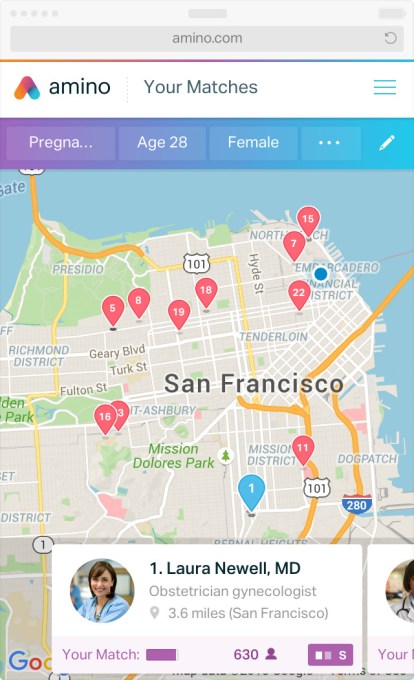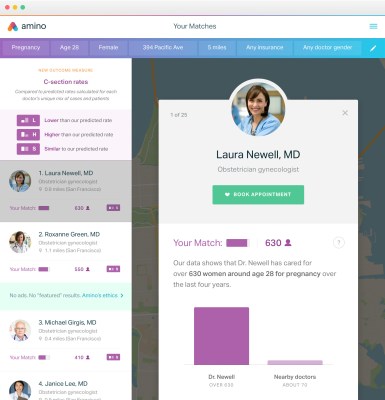Stealthy San Francisco-based digital healthcare startup Amino has been quietly amassing a database of U.S. consumer healthcare data since late 2013 to underpin the product it’s launching today: a search platform powered by heathcare transaction data from 188 million Americans — garnered from U.S. health insurance data — to make it easier for consumers to locate a doctor or specialist with experience treating other people with their condition, or who fits their healthcare requirements in other specific ways.
As well as matching doctors to patients based on their experience of treating others, the platform allows users to filter the results it provides them based on factors such as their location, or which healthcare providers accept specific healthcare insurance. Users can also book appointments via the platform (the booking piece is not a fully automated technology solution at this stage — rather Amino is bridging any tech gaps by getting on the phone itself to specific healthcare providers, where necessary. But it’s clearly betting on all-digital appointment-booking coming down the line in future to salve any scalability challenges with that aspect of its business).
Co-founder and CEO David Vivero is a former VP at Zillow, who also co-founded real-estate startup RentJuice back in 2009, which was acquired by Zillow for $40 million in 2012. He says the aim with Amino is to offer a data-driven alternative to people asking friends and family for healthcare recommendations, or finding recommendations via their insurance company websites — or indeed resorting to a Google search to try to track down a relevant doctor.
“The biggest share of how people do this is they ask friends and family and then they go on a phone tag experience, trying to figure out which doctors accept their insurance. And whether they’re available or not. So if we think about what we replace, we typically replace that activity… The next largest category, obviously, is people going to their insurance company websites,” Vivero tells TechCrunch.
“Or basically Googling. Five billion searches a month are healthcare related. And what’s problematic about that experience is you really get undifferentiated lists that are not personalized, that are not comprehensive, that are full of advertising, and so we think we really provide the best of asking a friend or family member because of how unbiased and data-driven it is, but also the convenience of being able to do this from your mobile phone.”
The idea for the product came after he left Zillow and was looking for individual health insurance for himself. Vivero has a hereditary health condition that — back in 2013 — meant he was denied health insurance. “That was awful and I did find health insurance eventually — I had to change my doctor. And every step of the way I felt, for someone who was relatively experienced in using all sorts of tools to feel good about the decisions I was making, I was shocked at the state of the art in being a healthcare consumer on my own.
“That’s when I decided to really call up some folks in user experience and design — really the people that had helped me build my first product at RentJuice — and we set out to solve this. I’d learned a lot when I was at Zillow about how important information is in freeing people up to make decisions and to feel good about their decisions.”
The increase in rates of electronic healthcare record penetration in the U.S. is one underlying driving factor making launching a data-driven consumer healthcare search platform possible at this point, according to Vivero. He also points to changes such as the Affordable Healthcare Act putting U.S. consumers more “in the driving seat” when it comes to making decisions about their healthcare. Tech-enabled big data processing is a third factor.
On the latter front, one key feature of the platform he flags up is something Amino calls “decision factors” — which refers to additional “patient-centric” search parameters that let users narrow results for specific types of searches based on additional personal preferences — and based on the platform performing risk adjusted analysis of healthcare data — so that, for instance, a female user who is pregnant can locate a doctor who has a low recent rate of C-section deliveries if she prefers to have a natural birth.
Vivero says Amino will be developing more of these decision factors to let users narrow results in ways that make sense for them — based on the feedback it gets from users.
“We’re going to be incredibly patient-centric in how we create the decision factors that go on Amino, but they’re incredibly personalized… We really want to make people feel like we’re listening to their needs — that we’re giving them answers that they never had before, and that it’s driven by data,” he adds.
Amino supports searches pertaining to around 900 different medical conditions at this stage. The platform is a web app, so there’s no need to download an app to use it. The website also does not require users register before they can perform searches, although if you do want to book a doctor via the platform it will obviously ask for some data at that point (it also asks for some data to help hone search results to your requirements and the specifics of your condition — such as your age and gender). And it’s free to use at this point.
Indeed, there’s currently no monetization structure in place, with doctors also being freely listed. Idea being, says Vivero, is it wants to present relevant, impartial data to help consumers make the best healthcare choices themselves — which means no paid listings, and no ads either.
“We are very excited to learn how people use our product. And in improving that product and adding additional services we may learn that there are great things that people are willing to pay for, but our current product is free — the information that we provide is free, it’s national. And our approach will be to design a business model that enhances the consumer experience, rather than taxes it as an advertising model, for example, I believe would,” he says.
One future monetization route might be around licensing data to people who make decisions in the healthcare system. “If you’re a health insurance carrier or if you are a self-insured employer or you are a health IT company that would benefit by knowing a bit more about the C-section rates of physicians or the ability for people with a hernia to get out-patient care, and other questions like that, that may affect the cost and quality of care, then people have been interested in actually licensing some of the results from Amino.”
So where exactly does Amino get its data? It’s been building that up via partnerships since work started on the business back in late 2013, according to Vivero. “We’ve accumulated this data over the course of many months, and now into years.” he says. “It’s been accumulated through a series of partnerships and investment, in both public and private partnerships. It’s primarily insurance claims data — so what’s great about insurance claims is that they are highly digital.
“What we do is we take the health insurance claims data, that can come from a whole host of different parts of the healthcare system, and we work with those third parties to ensure that we maintain patient privacy. So all of our sources of data work with us to de-identify all the data — so that the 188 million people inside of the database are anonymous.”
As well as pulling together a very large database of healthcare transaction information (comprising more than 3.9 billion data-points at this point, and apparently accounting for “nearly every practicing doctor in American”), data which he describes as “highly structured and overly specific” in terms of the core needs of healthcare consumers, Amino’s special sauce involves processing this data to create patterns and clusters so it can personalize results for individual users. For each search, it presents the user with a match score per potential physician, based on their search parameters. 
“Part of our investment… has just been trying to make this useable, trying to make this easy for people,” adds Vivero. “If we were just to publish health insurance claims data it would not be in any way a useful product for anyone. Instead what we’ve had to do is try to figure out, using machine learning, biostatistics, and other forms of data science methods to actually infer what’s happening inside of the doctor’s office by grouping a lot of these [healthcare transaction] codes, and clustering them and doing a lot of work to actually draw insight from them.
“The benefit is that the data is highly specific. So that means that we can really slice and dice some of these experiences so that people get a very personalized view. The challenge with that is if you were to publish the data in its raw form it wouldn’t be useable to all of us — and part of what Amino sets out to do is try to make this thing extremely easy for someone to make a competent decision, which means actually creating a nice layer in between the data and the product.”
Amino is backed by $19.4 million in pre-launch financing at this point, taking in what Vivero says was “a very quiet Series A” from Accel in mid-2014, as it worked on building out its data and the supportive analytics atop that, as well as testing the product and surveying consumers to shape a go-to-market strategy; followed “recently” by $13 million from Charles River Ventures. Rock Health and more than a dozen individual investors have also contributed to its coffers at this stage.
It has also formed an advisory board comprised of individuals from academic, healthcare, privacy and consumer tech fields in order to — in its own words — “ensure its approach, data methods, and services incorporate best practices”.
Current members of Amino’s board include: Dr. Ashish Jha (Faculty Director, Harvard Global Health Institute), Udi Manber (National Institutes of Health, and former VP of Engineering at Google), Dr. Arnold Milstein (Professor of Medicine and Director of the Stanford Clinical Excellence Research Center, Stanford University), Dr. Philip Pizzo (Professor and former Dean, Stanford School of Medicine), Joy Pritts (Former Chief Privacy Officer, Office of the National Coordinator for Health Information Technology, US Dept. of Health and Human Services), Bryan Sivak (Former Chief Technology Officer, U.S. Dept. of Health and Human Services), and Dr. Robert Wachter (Professor and Associate Chairman of the Department of Medicine, and Chief of the Division of Hospital Medicine and Chief of the Medical Service at UCSF Medical Center).
